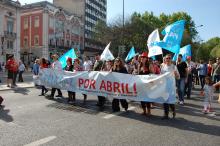45 years of the Final Act of the Helsinki Conference
At a time when we celebrate the end of the Helsinki Conference, which ended on August 1, 1975, with the signing of its Final Act by 35 countries, of which 33 were Europeans and included Canada and the United States, the Portuguese Council for Peace and Cooperation (CPPC) highlights its importance for security and cooperation and stresses and disseminates central aspects of its content.
The conference began in July 1973 in the capital of Finland, then continued in Geneva and finally ended again in Helsinki, on August 1, 1975, which coincided with important victories of the peoples, including in Portugal, where the revolutionary process which started with the overthrow of fascism on April 25, 1974 was underway.
General Costa Gomes, who was then President of the Republic and later became president of the national board of CPPC, represented Portugal in the adoption and signature of the Helsinki Final Act.
This important document stresses and develops 10 principles regulating international relations, collective security and development: sovereign equality of states; non-intervention in internal issues; peaceful settlement of disputes; inviolability of frontiers; territorial integrity; abstaining from recourse to the threat or use of force; respect for human rights and fundamental freedoms; equal rights and self determination of peoples; cooperation among states; fulfilment in good faith of obligations under international law.
It was based on these principles, and with the signatory states, that the only truly pan-European organisation, the Organization for Security and Cooperation in Europe (OSCE), was launched.
For Portugal, security and cooperation have a particular significance. Before the 25th of April, since it was a fascist state waging a colonial war, contrary to the principles being prepared; then later, because these principles coincided with those of democratic Portugal, and hence those principles are found in the Constitution of the Portuguese Republic, adopted on April 2, 1976, and are still enshrined there, namely in its article 7.
July 31, 2020
National Board of CPPC
-//-
45 anos da Ata Final da Conferência de Helsínquia
No momento em que se comemora o final da Conferência de Helsínquia, concluída a 1 de agosto de 1975 com a assinatura da sua Ata Final por 35 países, dos quais 33 europeus e ainda o Canadá e os Estados Unidos, o Conselho Português para a Paz e Cooperação (CPPC) assinala a sua importância para a segurança e a cooperação e sublinha e divulga aspetos centrais do seu conteúdo.
A conferência iniciou-se em julho de 1973 na capital da Finlândia, prosseguiu depois em Genebra e, finalmente, concluiu-se novamente em Helsínquia, no dia 1 de agosto de 1975, o que coincidiu com importantes vitórias dos povos, incluindo em Portugal, onde decorria o processo revolucionário iniciado com o derrube do fascismo em 25 de Abril de 1974.
Na aprovação e assinatura da Ata Final de Helsínquia, por Portugal, participou o então Presidente da República general Costa Gomes e que, posteriormente, foi também presidente da direção nacional do CPPC.
No importante documento, estão sublinhados e desenvolvidos 10 princípios reguladores das relações internacionais, da segurança coletiva e do desenvolvimento: igualdade soberana dos estados; não intervenção nas questões internas; resolução pacífica dos diferendos; inviolabilidade das fronteiras; integridade territorial; abstenção de recurso à ameaça ou uso da força; respeito pelos direitos humanos e liberdades fundamentais; igualdade de direitos e livre determinação dos povos; cooperação entre os estados; cumprimento de boa fé das obrigações contraídas segundo o direito internacional.
Foi a partir desses princípios, e com os Estados signatários, que se lançou a única organização na verdade pan-europeia, a Organização para a Segurança e a Cooperação na Europa (OSCE).
Para Portugal, segurança e cooperação têm particular significado. Antes do 25 de Abril, por ser um estado fascista em guerra colonial, contrário aos princípios em gestação; depois, por tais princípios coincidirem com os do Portugal democrático pelo que aqueles princípios se encontram na Constituição da República Portuguesa, aprovada em 2 de abril de 1976, e ainda hoje aí estão consagrados, designadamente no seu artigo 7º.
31 de Julho de 2020
Direção Nacional do CPPC

